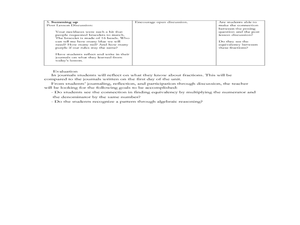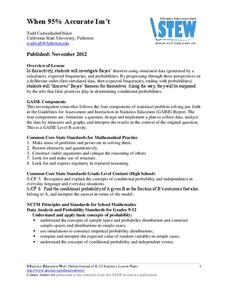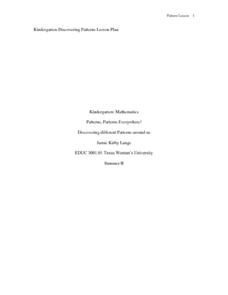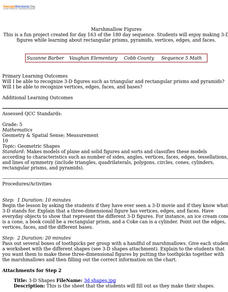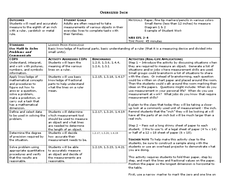Curated OER
Crafty Fractions
Fourth graders study fractions. In this fractions lesson, 4th graders define fraction-related vocabulary words. Students use beads to study fractions. Students draw shapes to study fraction equivalency and brainstorm fractions they use...
Curated OER
Calculus at the Battle of Trafalgar
Students read an article on how calculus is used in the real world. In this calculus lesson, students draw a correlation between the Battle of Trafalgar and calculus. The purpose of this article is the show everyday uses for calculus in...
Curated OER
Discovering Math Concepts in Advanced Algebra
Young scholars explore the concept of Chinese contributions in mathematics. In this Chinese contributions in mathematics lesson, students research Chinese achievements in mathematics. Young scholars solve 3x3 systems of equations using...
Curated OER
Money Math
Young scholars investigate the characteristics of the different coins. The teacher presents each coin, and the students identify the distinguishing characteristics of each side of the coin, and the value of each coin. The young...
Curated OER
Parallel and Perpendicular Lines and Lines of Symmetry: Rhombus Shadowing
Fifth graders demonstrate different types of lines using movement. In this line and movement lesson plan, 5th graders demonstrate parallel and perpendicular lines, and lines of symmetry using dance movement. They also demonstrate rhombus...
University of California
Euclidean Geometry
Go back to where it all began! Investigate how axiomatic systems and Euclidean geometry are based on undefined terms, common notions, postulates, and propositions by examining passages from Euclid's Elements. (Social studies teachers...
Curated OER
Energy Conservation
Students investigate energy conservation. In this energy conservation and analyzing data lesson, students identify and explain several energy sources and research renewable and nonrenewable energy sources. Students use statistics...
Curated OER
Narrow It Down
Ever played 20 Questions? A similar game helps young learners practice asking and answering yes-or-no questions. Spread out several objects, preferably all similar with slight variations (buttons or coins would work well). A leader...
Statistics Education Web
When 95% Accurate Isn’t
Investigate the effect of false positives on probability calculation with an activity that asks scholars to collect simulated data generated by a calculator. To finish, participants analyze the probability of certain outcomes which lead...
Curated OER
The Random Walk
Deep mathematical thinking is found with just a coin and a number line. Combining computing some probabilities in a discrete situation, and the interpretation of a function, this simple task gives learners a lot to think about on...
Texas Woman’s University
Patterns, Patterns Everywhere!
Not only is pattern recognition an essential skill for young children to develop, it's also a lot of fun to teach! Over the course of this lesson, class members participate in shared readings, perform small group...
Mathematics Assessment Project
Estimating Length Using Scientific Notation
Would you rather have a million dollars or 1 x 10^6 dollars? To find the answer to this question, class members first complete an assessment task converting numbers between decimal notation and scientific notation. They then take...
Inside Mathematics
Coffee
There are many ways to correlate coffee to life, but in this case a worksheet looks at the price of two different sizes of coffee. It requires interpreting a graph with two unknown variables, in this case the price, and solving for...
Curated OER
Congruent Polygons: Copying Stretchy Shapes
Third graders investigate congruent polygons through dance. In this congruency lesson, 3rd graders do the "brain dance" as a warm up. They review polygon names by singing "The Polygon Chant," before mirroring congruent shapes with a...
NTTI
I'll Halve S'more Please!
There is a lot to learn about fractions, and this is a fun way to do it! Individuals participate in a Cyberchase activity to describe a fraction in terms of sharing parts of a whole. They determine the meaning of the parts of a fraction,...
Curated OER
Marshmallow Figures
Students enjoy making 3-D figures while learning about rectangular prisms, pyramids, vertices, edges, and faces. After a lecture/demo, students use marshmallows, toothpicks and a worksheet imbedded in this lesson plan to create 3...
Curated OER
Budget Mania
Students examine several examples of budgets to develop a facility with the components of its formation. Income, expenses, and expenditures are considered and itemized for this lesson plan.
Curated OER
Kernel Count!
Here is an impressive and thorough lesson on estimation. Young mathematicians estimate how many kernels of popcorn can fit in a tablespoon, then how many tablespoons of kernels can fit in a baby food jar. The popcorn is then popped. All...
Tech4Learning
Fantastic Fractions
Learners study how shapes can be divided into equal parts, that each part be equal to its counterpart, and combining parts equals one whole. They make the shapes out of modeling clay and take digital pictures of its parts to create an...
Curated OER
Many Paths
Students explore the composition and practical application of parallel circuitry, compared to series circuitry. They design and build parallel circuits and investigate their characteristics, and apply Ohm's law. They recognize that...
Curated OER
Oversized Inc
Fourth graders become familiar with fractional parts of a ruler. In this measurement lesson, 4th graders measure various objects to an 1/8 of an inch. Students measure a piece of paper based on teacher direction....
Bowland
Alien Invasion
Win the war of the worlds! Scholars solve a variety of problems related to an alien invasion. They determine where spaceships have landed on a coordinate map, devise a plan to avoid the aliens, observe the aliens, and break a code to...
Project Maths
Introduction to Probability
Take a chance with an activity sure to improve your class's skills. An introductory lesson focuses on probability and chance. It shows how probability is always a value between zero and one, i.e., the probability of an event is always...
5280 Math
Stories That Formulas Tell
Learn the stories a formula holds. An interesting lesson takes a unique approach to teach how to use formulas. Beginning with a formula, learners predict what the variables stand for and then use the formula to make calculations and tell...
Other popular searches
- Everyday Mathematics
- Math in Everyday Life
- Everyday Math Skills
- Everyday Math Grade 5
- Everyday Math Number Sense
- Everyday Math Fourth Grade
- Everyday Math Grade 2
- Grade 1 Everyday Math
- Everyday Mathematics Arrays
- Algorithms in Everyday Math
- Everyday Math 3
- Everyday Mathematics Review
